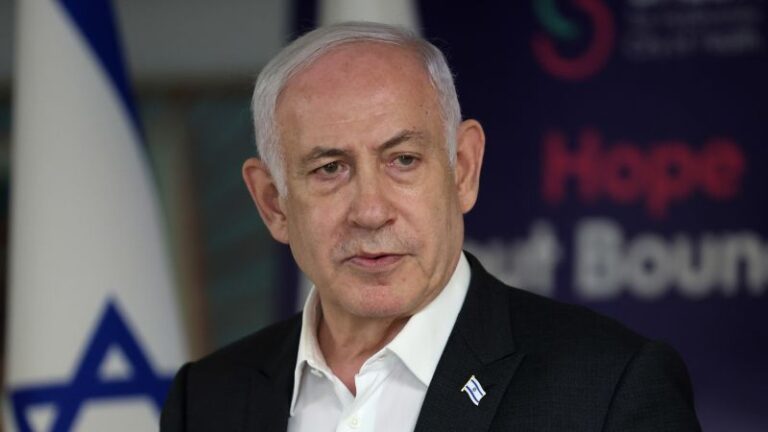Jack Guess/Pool/Getty Images
Israeli Prime Minister Benjamin Netanyahu visits Sheva Tel Hashomer Medical Center in Ramat Gan, Israel, June 8, 2024.
CNN
—
Israeli Prime Minister Benjamin Netanyahu said Sunday that the “escalation of the war with Hamas (in Gaza) will soon be over” and that the military’s focus could then shift to Israel’s northern border with Lebanon, where fighting with the Iran-backed group Hezbollah has intensified in recent weeks.
But Prime Minister Netanyahu vowed that Israel would continue its operations in Gaza until the militant group Hamas was eliminated.
“It doesn’t mean the war will end, but the war at this stage will end in Rafah, that’s a fact. We will continue cutting grass afterwards,” Netanyahu told Channel 14 television in his first exclusive interview with local Israeli media since October 7.
More than one million Palestinians took refuge in Rafah before Israel launched an air and ground operation in the southern Gaza city, ignoring international calls. Around 800,000 people have since fled the city, with the UN food agency describing the situation there as “apocalyptic.”
The city’s border crossing with Egypt is a key entry point for humanitarian aid but has remained closed since Israeli forces seized it early last month.
International pressure over Israel’s actions in Gaza has been growing since it launched its military operation in Rafah. Last month, the United Nations’ highest court ordered Israel to immediately end its controversial military operation in Gaza, citing “dire” humanitarian conditions.
In the interview, Netanyahu said he was ready to reach a “partial agreement” with Hamas to return some of the hostages still being held in Gaza, but reiterated his position that the war would continue after a ceasefire “to achieve the goal of eliminating Hamas.”
“I’m not going to abandon it,” Netanyahu said.
The prime minister faces protests across Israel calling for a ceasefire in Gaza and the return of all hostages. On Saturday, family members of the hostages joined ongoing anti-government protests in Tel Aviv, Jerusalem, Herzliya, Caesarea, Ra’anana, Beersheba, Kiryatgat and the town of Pardes Hanna Karkul, among others. Many protesters called on the government to accept the hostage release agreement.
The US-backed three-phase ceasefire plan proposes a “permanent cessation of hostilities in exchange for the release of all other hostages remaining in Gaza and the complete withdrawal of Israeli forces from Gaza.”
The rift between the Israeli government and military also appears to be widening. Following Israel’s devastating bombing of the isolated Gaza Strip, Netanyahu has come under increasing pressure from government officials and Israel’s allies, including the United States, to draw up a post-war strategy for governing Gaza.
Responding to the prime minister’s remarks, Hamas said Netanyahu’s words showed he was seeking only a partial agreement, not an end to the Gaza war.
In a statement, Hamas said Netanyahu’s position “clearly confirms his rejection of recent Security Council resolutions and the proposals made by U.S. President Joe Biden.”
Hamas continues to insist that any agreement must include “clear confirmation of a permanent ceasefire and a complete withdrawal from the Gaza Strip.”
Netanyahu also told Channel 14 television: “Once the intense fighting phase is over, there is the possibility of transferring some power to the north and we will do that.”
“Firstly, for protection and secondly, to bring people back. If it is possible politically, great. If it is not possible, we will find another way to make it happen, but we will bring everyone back, north and south,” he added.
Hezbollah, the Iranian-backed Islamist group which has one of the most powerful paramilitary groups in the Middle East, has been carrying out deadly attacks from southern Lebanon into northern Israel since October 8, the day after Hamas’ attack on Israel.
Israel responded to the Hezbollah attack with strikes, killing Hezbollah fighters, including a senior commander.
The ongoing conflict has forced tens of thousands of Israelis to flee their homes in northern Israel, while villages in southern Lebanon have also been emptied.
A rise in cross-border attacks in recent weeks has raised fears that a new full-scale conflict could erupt in the Middle East.
Israeli officials have told the US they plan to shift resources from southern Gaza to northern Israel in preparation for a possible attack against Hezbollah, a US official told CNN on Wednesday. The impact of an escalating war between Israel and Hezbollah could be devastating, US officials have previously told CNN.
U.S. officials have serious concerns that if all-out war broke out between Israel and Hezbollah, the Iranian-backed militants could overwhelm Israel’s northern air defenses, including its much-vaunted Iron Dome air defense system.
During the interview, Netanyahu was also asked whether a deal or war was the solution to ending the conflict with Hezbollah.
The prime minister responded: “If there is an agreement, it will be on our terms. Our terms are to end the war, to leave Gaza, not to leave Hamas there. I refuse to leave Hamas there. We need to get rid of Hamas.”
Israel launched its war in Gaza following an Oct. 7 Hamas attack in which militants killed about 1,200 people and took more than 250 hostage. More than 37,000 people have been killed in Israeli military operations since then, according to the Gaza Health Ministry.
This news bulletin has been updated.

